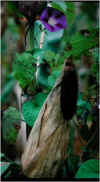 THE
GARDEN GOURMET--July 2008 THE
GARDEN GOURMET--July 2008
Weeds! That’s what most gardeners face today--especially
those that go the old-fashioned route of plain dirt, no chemicals.
But there are garden tricks that will ease the
pain of weed eradication. Still, it is sweat and blood work, though it
delivers a certain satisfaction at seeing one’s garden develop with few
weeds, no chemicals.
The ingredients for an almost weedless garden
(you seldom get all of ‘em) are water, elbow grease in plentiful amounts,
and time. Combined they will not put weeds on the endangered list, but
they will help thin ‘em out.
That is to say that the hoe alone is only a stopgap
because weeds seem to develop a great root system. Cut them off with a
hoe above the roots and the next watering will bring them back strong as
ever--maybe stronger.
Here’s the way I do it, but I must confess it
is a slow, never-ending process (until frost intervenes). But it makes
one’s garden presentable.
An overview of the weed scenario may give the
gardener a different view of weeds. We say we hate them, and that may be
correct. But after the early summer battle with weeds, it may be that weeds
serve a beneficial purpose. At least I like to think that every thing on
earth does.
You see, after the garden plants have attained
maturity--especially tomatoes--weeds tend to hide the fruits from killing
frosts. They extend the gardening season. They protect the fruits from
the hot sun, too.
Still, I have no defense for weeds when the garden
goes through the developing season--the spring and early summer.
So much for garden philosophy and getting back
to the weeds that are ever at hand . . . literally and figuratively.
My process for killing weeds when the ho, ho,
hoe is laid aside, is to manually pull them up by the roots.
Just as a weed cut off above the roots will revive,
weed roots baking in the hot sun on earth’s surface are doomed. I pull
them up, break the soil away from the roots, and it is best to take them
away from the garden. The sun and air will polish them off.
Pulling weeds from dry soil is pure, unadulterated
work. Some are next to impossible to pull if the weed is more than a foot
above the earth. But if these weeds have had a good soaking (rain or artificially)
their roots surrender fairly easy. But it still is work.
I usually sprinkle well (but only on the plant
and weeds surrounding the plant). Isolated weeds are treated the same way.
I leave the surrounding area dry so I can sit while I weed. Weeding from
a standing position is a back-breaking process. Crabgrass is very difficult,
but it can be obliterated by gathering all of the stems of a plant and
lifting the roots out. This is slow but effective. Be careful not to pull
your plants.
There are so many weeds, that I will not try to
mention them. But pigweed, purslane, dandelion, and plantains are big menaces.
Pigweed is upright; plantain, dandelion, and purslane hug the earth.
I keep a bucket handy and the roots go there.
They eventually are dumped in the road to be squashed by cars.
Of course, all weeds are targets.
FRY RADISHES?--
Recently, while doing some of my experimental cooking, I sliced some of
the red radishes (about one-eighth inch thick, like a carrot ring), added
onion slices, and sauted them together in olive oil until the onion slices
were showing signs of browning.
To my surprise, the radishes seemed to offer a
different taste. They became a rather “chewy” but pleasant tasting meat
garnish.
Later, I sliced dry-chilled radishes cold on a
lunchmeat and American cheese sandwich (whole-wheat bread with mayonnaise
and mustard) to create a zingy sandwich. I left the skins on the radishes.
Click on thumbnail image for enlarged view.

|
| Weeds,
like this morning glory climbing a cornstalk in fall, offer an undenied
aesthetic value. |
|

